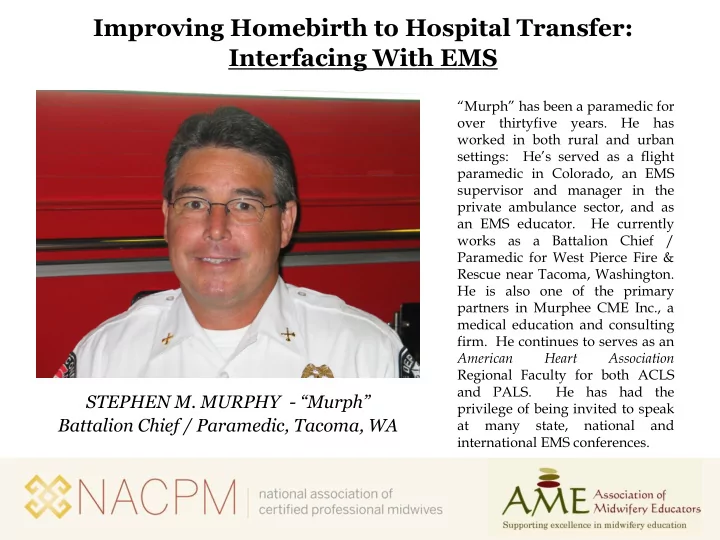

Improving Homebirth to Hospital Transfer: Interfacing With EMS “ Murph ” has been a paramedic for over thirtyfive years. He has worked in both rural and urban settings: He’s served as a flight paramedic in Colorado, an EMS supervisor and manager in the private ambulance sector, and as an EMS educator. He currently works as a Battalion Chief / Paramedic for West Pierce Fire & Rescue near Tacoma, Washington. He is also one of the primary partners in Murphee CME Inc., a medical education and consulting firm. He continues to serves as an American Heart Association Regional Faculty for both ACLS and PALS. He has had the STEPHEN M. MURPHY - “ Murph ” privilege of being invited to speak Battalion Chief / Paramedic, Tacoma, WA at many state, national and international EMS conferences.
Bridge the Gap Between Emergency Medicine and Midwifery Horror stories on both sides of the fence… Goals: • Smooth transitions • Increase mutual understanding • Bridge the Gap!
Overview of EMS Levels: • First Responder – 40 hours total training, 1 hour childbirth • Emergency Medical Technician (EMT) – 120-170 hours (one semester), 4-6 hours of childbirth, labs with mannequin • EMT Intermediate – additional 40-120 hours, mostly in advanced skills such as IVs, etc. No additional childbirth hours • Paramedic – 1500-2600 hours total training, including 80 hours childbirth, observe on LD deck 24 hours Childbirth training limited to just the basics Expertise: Resuscitation +Trauma
Countrywide EMS • 80% volunteer • Mostly EMTs • Paramedics mostly located in urban areas • Mostly don’t know about midwifery “Physician Extenders” Operate under physician protocols
Recommendations Let us know you are a care provider • • Quickly summarize problem • Understand our limitations: • Laws restrict where we can transport May need physician • We may need to take control • • Work with us to determine who is in charge • Get to know your local EMS system • Educate EMS about your work
Recommend
More recommend